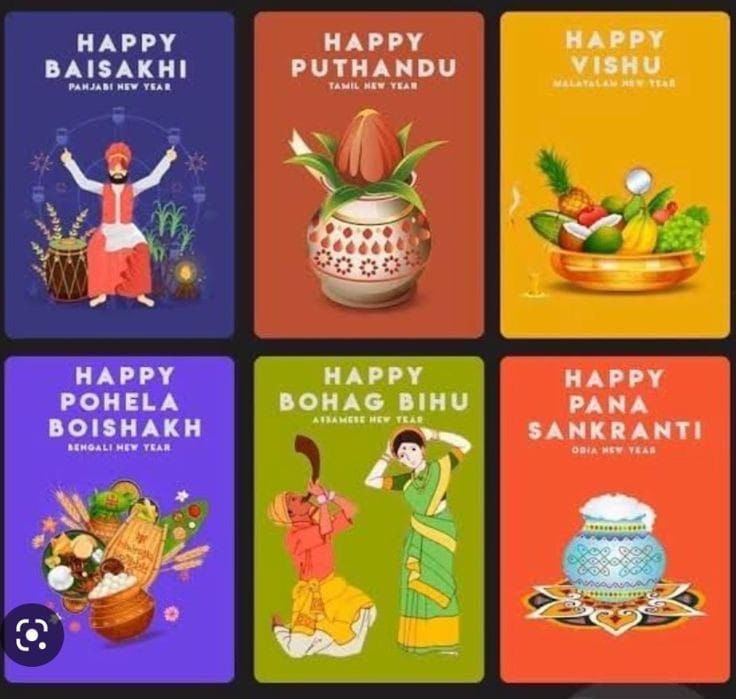CLN News Desk got in touch with a few reliable custodians of Kodava culture and customs – especially Bacharanianda Appanna Ajja and Pardanda Subramani. Without exception, all maintained that Edamyaar Ondh is the first day of the first month of the Kodava New Year. The calendar year coincidentally aligns itself with the paddy cultivation cycle.
This day was NOT celebrated by the community as a festival with the same fervour as Keilpodh or Puthari in the past and was quietly observed at individual homes/Okkas – especially those who cultivated their paddy fields. To this extent, large scale circulation of elaborate greetings on social media is bit overdone.
The Edamyaar Ondh mirrors more the customs followed in Tulunad known as Pundi Bittu (Handful of seeds – for planting). This is quite distinct from Vishu, as per the Malayalam calendar, which marks the New Year in Kerala and holds deep cultural, spiritual, and social significance for them. Vishu is observed on Mesha Sankranti, or Mesha Sankramam, and is dedicated to the worship of Lord Vishnu and Lord Krishna, marking the beginning of a new astrological cycle. None of the latter is really relevant for Kodavas.
What matters is that most rice growing communities celebrate this festival – of course for different reasons – but the underlying theme is Prosperity, Good Health and Joy for ALL is a common thread. Just to recapitulate the festivals we are reproducing it below:

Paradanda Subramani made a good suggestion of sharing a meaningful video message by Uluvangada Kaveri Udaya. She is an accomplished writer, poet, dramatist and actually writes in five languages on Kodava culture. She hails from T Shettagiri. Her methodology is consultative and the only motivation or inspiration is her passion to understand and promote Kodava culture. – CLN Newsdesk
Kaveri Udaya hails from T. Shettigeri village. She is the daughter of Changulanda C. Madappa and Saraswati. After completing her education in Puttur, she married Uluvangaḍa U. Udaya in 1990.
A multilingual writer, poet, amateur stage artist, and painter, she writes in five languages – Kannada, Kodava, English, Hindi, and Malayalam. Her literary contributions include stories, poems, novels, couplets, biographies, devotional and reflective essays, and plays. A total of 32 works have been published. She has rendered poetry readings in six different languages.
She holds significant positions in various literary and cultural organizations:
President, Kannada Sahitya Parishat, Srimangala Hobli
President, Sirigannada Vedike – Women’s Wing, Kodagu District
Honorary President, Gurukula Kala Pratishtana, Kodagu District
Vice President, Karnataka Women Writers’ Association – Kodagu Branch
One of her novels has been made into a Kodava-language film, and one of her short stories has been adapted into a short film. Many of her songs have been performed by various singers and are regularly broadcast on Madikeri Akashavani’s “Suprabhata” program.
She has recited poems in both Kodava and Kannada languages at the prestigious Mysore Dasara Poetry Gathering and has presided over several poetry and literary events. She has written and directed mythological and social plays, especially focusing on women’s participation, and has herself played lead roles.
Major Awards:
Kittur Rani Chennamma Award (2022) – Government of Karnataka
Makkala Chandira Book Award – Karnataka Bal Vikasa Academy
Gurukula Shiromani Award – Gurukula Kala Pratishtana
Book Award – Karnataka Kodava Sahitya Academy
Sahitya Ratna and Sahitya Tapasvi Awards – Nadina Samachara Daily
Multilingual Literary Achiever Award – Mysore Literary and Cultural Academy
Kannada Multilingual Literary Siri Award – Vidyadhara Kannada Academy
Honorary Doctorate – International Culture Research University
She has been felicitated by 23 different organizations for her literary contributions.



Wholeheartedly agree with the introductory comments by CLN. Let’s not create one more Namme! We Kodavas seem to have a new found Namme to celebrate every week, if not every other day. Let’s make HARDWORK a buzz word for celebration – after all who will grow the paddy/rice for us to bring to the table if we don’t grow it as a community?
Our ancestors have carefully set out a meaningful low profile celebration of all auspicious occasions with the available resources . If we really believe in our old traditions and consider ourselves as ancestral worshippers then it’s time for all of us follow the tenets or deep-rooted thinking ignoring the Brahminical influence and avoiding unnecessary social obligations. This will help us focus on improving our livelihood, overall quality of life and the local economy.
What is written is true – my father and grandfather’s generation treated Edamyaar Ondh as an auspicious occasion and quietly went about their chores as described so well by Uluvangada Kaveri Udaya. I truly wish that we focus on growing paddy and earning the right to celebrate Puthari or for that matter undertake Tulebara at the Igguthappa Temple with rice from homegrown paddy. Social media posts with people posing with the plough dressed in a Kupya is a bit over the top!